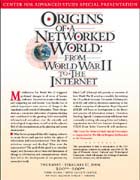Origins of a Networked World: From World War II to the Internet
Third Floor, Levis Faculty Center
919 W. Illinois St.Urbana
Mobilization for World War II triggered profound changes in all areas of human endeavor. Innovations in microelectronics and computing are well known. Less familiar but of critical importance were vectors of change in the organization and retrieval of information. These changes drew on a concurrent elaboration of systems thinking and contributed to the growing hold exercised by informational metaphors over the scientific and technological imagination, as well as in the adjacent field of telecommunications policy planning and system development.
What factors prompted this wide-ranging endeavor to recast theory and practice within the sphere of information and communications? How did these initiatives emerge and develop? What were the repercussions? The goal of this panel is to stimulate inquiry and discussion about these vital dimensions of change in information and communications, which have led to the development of our present-day networked world.
Mark Leff (History) will provide an overview of how World War II acted as a crucible for rewiring the US political economy. Fernando Elichirigoity (GSLIS) will address alterations underway in the cultural conception of information. Boyd Rayward (GSLIS) will focus on developments in the theory and practice of information science. Christian Sandvig (Speech Communication) will discuss how constantly evolving telecom policies and industry organization have fed into Internet development. GSLIS Dean John Unsworth will moderate.
This presentation is held in anticipation of the CAS interdisciplinary initiative for academic year 2005-06 The Age of Networks: Social, Cultural and Technological Connections, which will examine the workings of networks across the sciences, arts, and humanities.
This Center for Advanced Study Special Presentation is cosponsored by The Illinois Program for Research in the Humanities.

